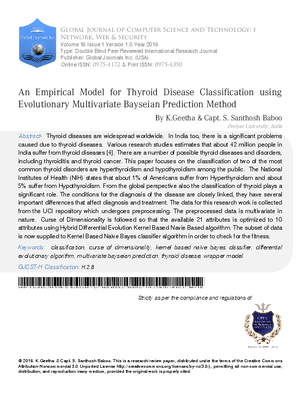Abstract
Thyroid diseases are widespread worldwide In India too there is a significant problems caused due to thyroid diseases Various research studies estimates that about 42 million people in India suffer from thyroid diseases 4 There are a number of possible thyroid diseases and disorders including thyroiditis and thyroid cancer This paper focuses on the classification of two of the most common thyroid disorders are hyperthyroidism and hypothyroidism among the public The National Institutes of Health NIH states that about 1 of Americans suffer from Hyperthyroidism and about 5 suffer from Hypothyroidism From the global perspective also the classification of thyroid plays a significant role The conditions for the diagnosis of the disease are closely linked they have several important differences that affect diagnosis and treatment The data for this research work is collected from the UCI repository which undergoes preprocessing The preprocessed data is multivariate in nature Curse of Dimensionality is followed so that the available 21 attributes is optimized to 10 attributes using Hybrid Differential Evolution Kernel Based Navie Based algorithm The subset of data is now supplied to Kernel Based Na ve Bayes classifier algorithm in order to check for the fitness
This work is licensed under a Creative Commons Attribution 4.0 International License.
Copyright (c) 2016 Authors and Global Journals Private Limited

